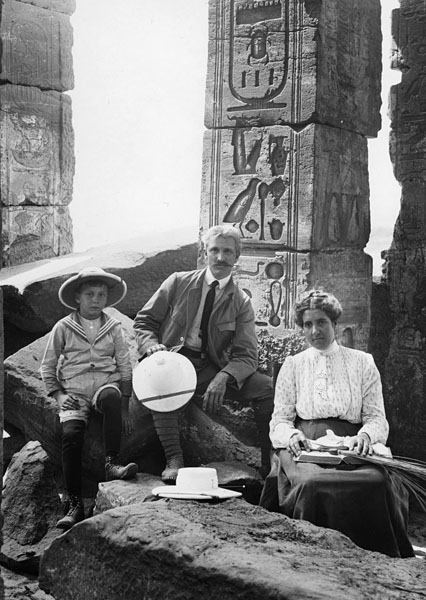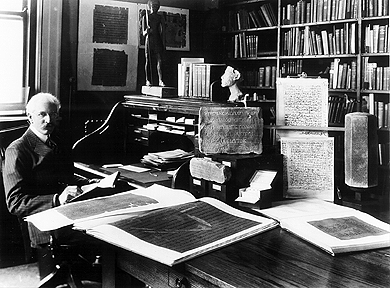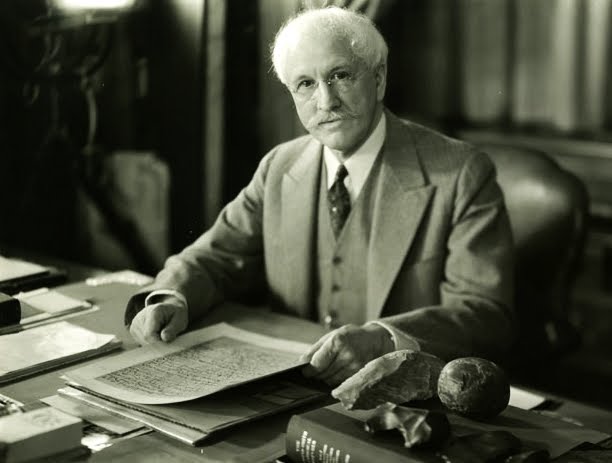<Back to Index>
- Archaeologist James Henry Breasted, 1865
- Writer Theodore Herman Albert Dreiser, 1871
- Duke of Saxony George the Bearded, 1471
PAGE SPONSOR


James Henry Breasted (August 27, 1865 – December 2, 1935) was an American archaeologist and historian. After completing his PhD at the University of Chicago in 1894, he joined the faculty as an instructor. He was allowed to work on the Berlin Dictionary of the Egyptian Language. In 1901 he became director of the Haskell Oriental Museum at the University of Chicago, where he continued to concentrate on Egypt. In 1919 he became the founder of the Oriental Institute at the University, designed to be a lab for research into the rise of civilization in the Near East. In 1905 Breasted was promoted to professor in the first chair in Egyptology and Oriental History in the United States.
Breasted's English and Dutch ancestors came to the American continent in the 17th century with the surname Van Breestede. His father was a small hardware business owner in the 8,000 strong town of Rockford, Illinois, where just months after the assassination of Lincoln and end of the Civil War, Breasted was born.
He was educated at North Central College (then North - Western College) (B.A. 1888), the Chicago Theological Seminary, and Yale University (M.A. 1892), where he studied under the Hebrew scholar William Rainey Harper. Harper encouraged Breasted to go to the University of Berlin, where he earned his PhD (1894) under the instruction of Adolf Erman. He was the first American citizen to obtain a PhD in Egyptology. That
same year he married Frances Hart, who was in Germany learning the
language and studying music together with her sisters. The couple
honeymooned in Egypt. It turned into a working vacation as Breasted had
been recruited to build a collection of Egyptian antiquities for the
University of Chicago. Hart and her sisters were in Germany at the same time as Breasted, learning German and studying music. Hart died four decades later in 1934. The widower Breasted would marry one of her sisters. He became an instructor at the University of Chicago in 1894 soon after earning his doctorate. Five years later, UC agreed to let him accept the Prussian Academy's
invitation to work on their Egyptian dictionary project. From 1899 to
1908, he did field work in Egypt, which established his reputation. He
began to publish numerous articles and monographs, as well as his History of Egypt from the Earliest Times Down to the Persian Conquest in
1905. At that time he was promoted to Professor of Egyptology and
Oriental History for Chicago (the first such chair in the United
States). In 1901, Breasted was appointed Director of the Haskell Oriental Museum (forerunner of the Oriental Institute),
which had opened at the University of Chicago in 1896. Though the
Haskell Oriental Museum contained works of art from both the Near East
and the Far East, Breasted's principal interest was in Egypt. He began
to work on a compilation of all the extant hieroglyphic inscriptions, which was published in 1906 as Ancient Records of Egypt. It
continues to be an important collection of translated texts; as Peter
A. Piccione wrote in the preface to its 2001 reprint, it "still
contains certain texts and inscriptions that have not been retranslated
since that time." Through
the years, as Breasted built up the collection of the Haskell Oriental
Museum, he dreamed of establishing a research institute, “a laboratory
for the study of the rise and development of civilization” that would
trace Western civilization to its roots in the ancient Middle East. As World War I wound down, he sensed an opportunity. He wrote to John D. Rockefeller Jr.,
son of the major donor to the University, and proposed founding what
would become the Oriental Institute. He planned a research trip through
the Middle East, which he suggested was ready to receive scholars.
Rockefeller responded by pledging $50,000 over five years for the
Oriental Institute. He separately assured the University of Chicago
President Judson to pledge another $50,000 to the cause. The University
of Chicago contributed additional support and, in May 1919, the
Oriental Institute was founded. Breasted
had two key objectives for the field trip: to purchase antiquities for
the Oriental Institute and to select sites for future excavation. The
group ultimately consisted of Breasted and four of his students (or
former students): Ludlow Bull, William Edgerton (both graduate students
in Egyptology); Daniel Luckenbill (professor of Assyriology at the
University of Chicago), and William Shelton (a former student who was a
professor of Semitic languages at Emory University). The general itinerary of the expedition was: August
1919: from Chicago to England, by way of New York and France September
1919: England October 1919: from England to Cairo, by way of Paris,
Venice, and Alexandria November 1919: Egypt December 1919: Egypt
January 1920: Egypt February 1920: from Egypt to Bombay March 1920:
Bombay to Basra, Mesopotamia April 1920: Mesopotamia May 1920: from
Mesopotamia to Arab State (today Syria) and Beirut June 1920: from
Damascus to Jerusalem, Haifa, Cairo, and London July 1920: to Chicago As
Breasted scouted future archaeological sites and visited antiquities
dealers, he came to know many of the British political figures and
scholars working in Egypt. These included Gertrude Bell, Howard Carter, Lord Carnarvon, Lord Allenby, and the Arab leader Faisal,
who would become king of Iraq. Due to Breasted's extensive travels and
knowledge of the political situation throughout the Middle East, Lord
Allenby, at that time the High Commissioner for Egypt, requested that
he inform the British Prime Minister and Earl Curzon about the hostility of the western Arabs to the occupying British forces before returning to America. Breasted's acquisitions were significant for the growth and scope of the collections of the Oriental Institute and the Art Institute of Chicago. One of his most well known purchases was the mummy of Meresamun, a singer in the interior of the Temple of Amun at Karnak. On this trip, Breasted showed far greater confidence in his selections, as well as a talent for negotiating with dealers. Although he did not considered himself a connoisseur of Egyptian art, he
developed a keen eye for objects of beauty that were also highly instructive. The first excavation of the Oriental Institute was in Egypt at Medinet Habu, one of the sites which he had recommended. Breasted returned to Egypt frequently; in 1922 and 1923 he aided Howard Carter in deciphering the seals from the recently discovered Tomb of Tutankhamun. On April 25, 1923, Breasted became the first archaeologist to be elected to membership in the National Academy of Sciences. The honor helped to legitimize the struggling profession of archaeology in American academic circles. Breasted died on December 2, 1935 of a streptococcus infection after returning from his last expedition.
While at Chicago, Breasted had a home built near the university. Its carriage house was designed to look like a
mastaba. The house is now used as the fraternity house of Phi Gamma Delta. Breasted is buried in Greenwood Cemetery, Rockford, Illinois. His grave site is marked with a large Aswan granite cube, marked simply with his name and “historian and archaeologist.”
Breasted
was in the forefront of the generation of archaeologist - historians who
broadened the idea of Western Civilization to include the entire Near
East in Europe's cultural roots. Breasted coined the term "
Fertile Crescent"
to describe the archaeologically important area including parts of
present day Iraq, Syria, Lebanon, Jordan, Palestine and Israel.

